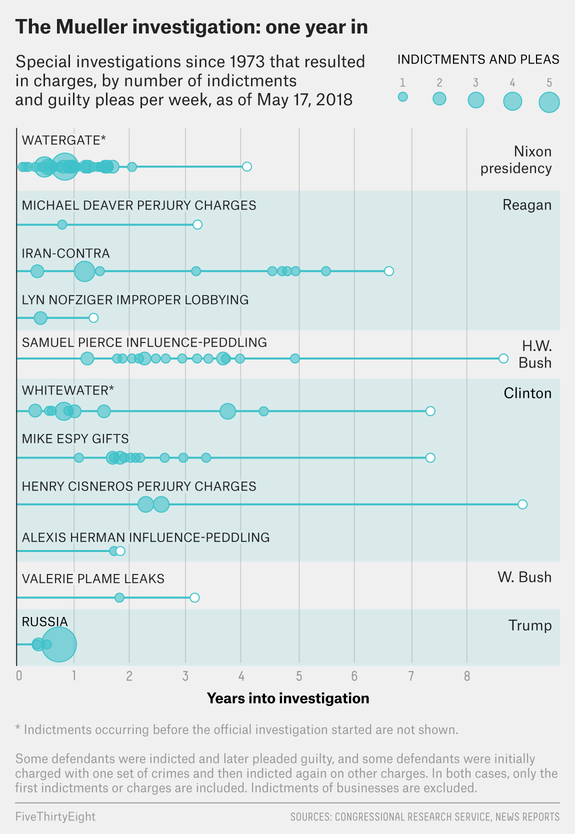We’re into our second year of the Russia investigation into a. the ties between Trump’s campaign and Russia, and b. the question if Trump obstructed the investigation.
Meanwhile, Trump and his supporters (co-conspirators?) spout outright lies & conspiracy theories on Twitter, and to the media, almost every day. On Sunday, Trump ‘demanded’ by tweet that the FBI be investigated. (So the subject of the investigation, demands that the investigators be investigated).
Just today, Trump repeated allegations that federal investigators had used spies against his presidential campaign (‘Spygate’. OK .. evidence, please?).
Anyway, let’s focus. Below is a great comparison of special investigations since 1973. Take-away: Mueller has found a lot of wrongdoing already, but probably has a year – or more – to go.
Then today, the New York Times, laid out the main possible outcomes when Special Counsel Mueller eventually completes his investigation.
Outcome 1: Trump did nothing wrong.
Outcome 2: Trump broke the law (many possibilities here).
> 2.1: Mueller’s Least Aggressive Option: Mueller submits a report (to Deputy AG Rod Rosenstein).
> 2.2: The ‘Nixon Option’: A grand jury from Mueller’s investigation deems Trump an un-indicted co-conspirator & sends a report to Congress.
> 2.3: Mueller’s Most Aggressive Option (unlikely): Mueller indicts Trump.
Additional Notes:
Note a. Deputy AG Rod Rosenstein is the gatekeeper for Outcome 2, and Mueller’s report goes to him first .. but if Mueller tries to indict (2.3), and Rosenstein says ‘No’, that triggers an automatic report to Congress.
Note b. The Nov 2018 Mid-term Elections will likely happen before Mueller’s investigation is done.
> If Republicans then control the House: Impeachment proceedings will start only if the report has damning evidence of wrongdoing, or of breaking the law.
> If Democrats then control the House: They will face tremendous pressure to do something. They are likely to consider impeachment.


